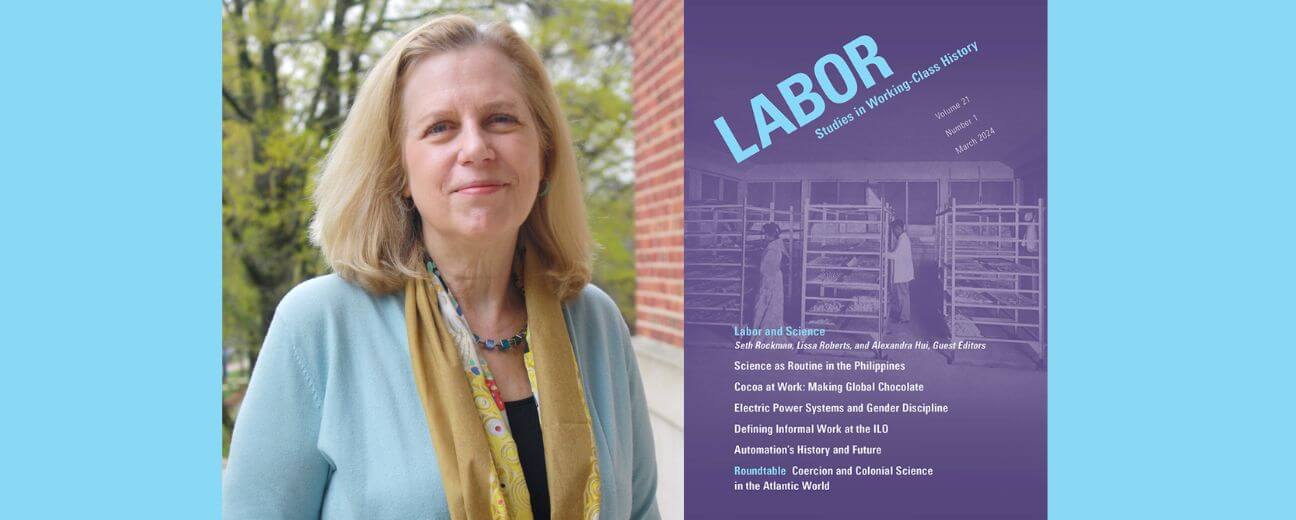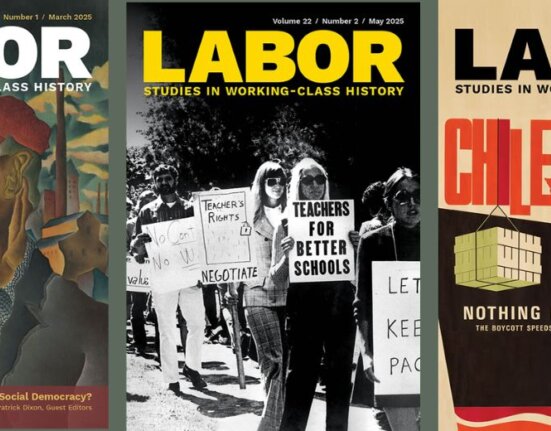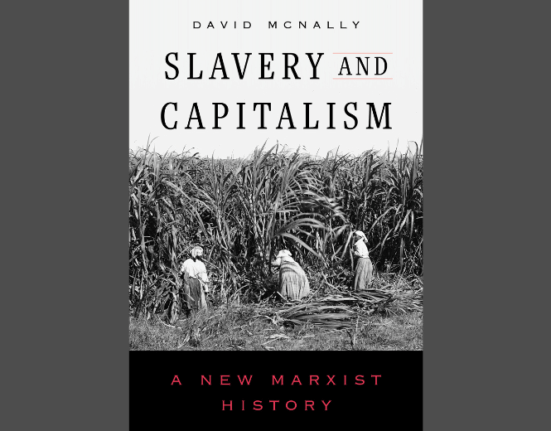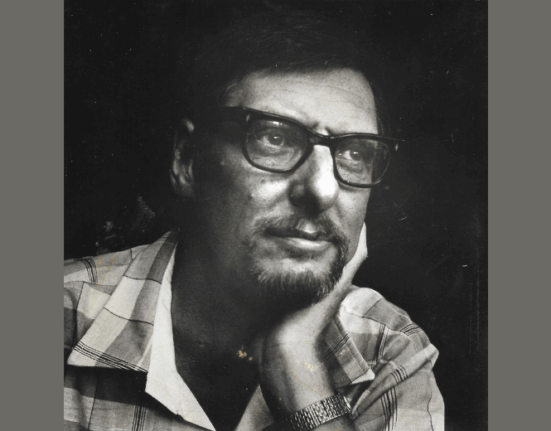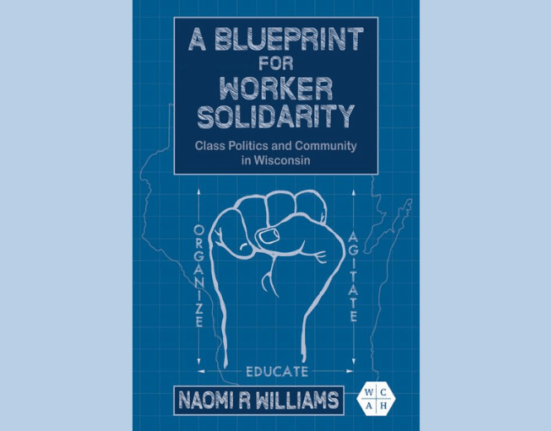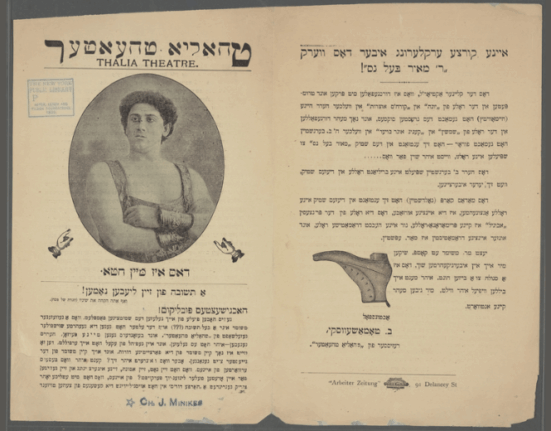Beginning with the new Labor: Studies in Working Class History, Julie Greene assumes editorship of the journal. Maia Silber interviewed her for the recent LAWCHA newsletter, and this is an expanded version of that interview.
You received your PhD in 1990 from Yale University, where you studied under David Montgomery, one of the founders of the “New Labor History.” What brought you to the field?
My roots were originally in British and European history. Labor history was very vibrant in Europe, and I did a master’s degree at the University of Cambridge where I studied with scholars like Gareth Stedman Jones and John Barber, but also Zara Steiner on foreign relations history. Just through happenstance I started studying Welsh miners and the Communist Party in the 1930s, and wrote a thesis on that topic. My focus on labor history is owed to that research, as well as to my interest in Marxist historiography and left politics. So, when I left my program at Cambridge I decided to stick with the workers but shift from British and European to U.S. labor history. The state of the field of history was such that labor and working-class history felt central to the discipline. I appreciated David-Montgomery’s effort to retell American history from the perspective of the workers, and I also appreciated the ways in which the field was linked to contemporary politics and social justice issues. Workers were just one way– but to me, a really important way, to do history from the bottom up. There were things I didn’t like about Yale, but I liked working with David Montgomery and the other students he had recruited: Dana Frank, Eric Arnesen, Toni Gilpin, Tera Hunter, Karin Shapiro, Priscilla Murolo. It was a stimulating cohort of students all focused-on labor.
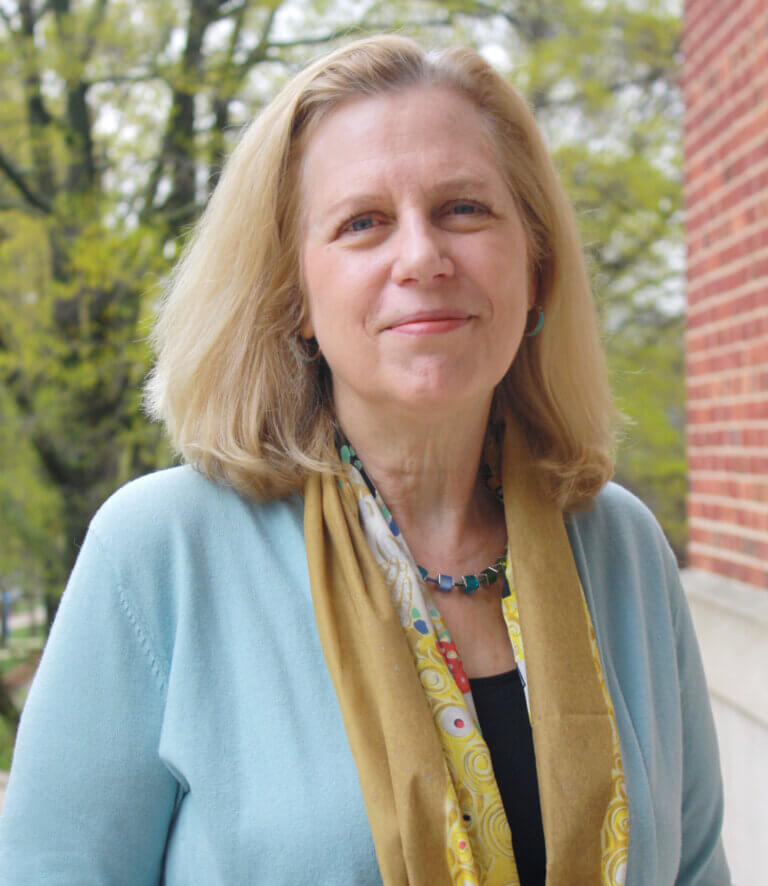
You were one of the founding co-chairs of the Labor and Working-Class History Association in 1998. What led you and your colleagues to establish the organization, and what were your
goals?
The beginning of LAWCHA was very exciting. Our conversations started in the mid 1990s, and at that time we [labor historians] didn’t have any central organization. It felt like a balkanized field. It had pillars of support, but they were quite separate from each other. We had the North American Labor History Conference at Wayne State every year, and we had the journal Labor History which was edited for many years by Dan Leab. We started talking about the need for an organization that would connect us all and generate dialogue and community. From the very beginning there was an instinct that we needed to redefine what labor and working-class history was– that it’s not only unions and industrial labor and white guys, but also a field that connects to all the different subfields of history. There was a consensus that labor history was under strain and that we needed gender, sexuality, race and ethnicity to be more central to the discipline. We also wanted to have an organization that would be politically engaged, connecting history to contemporary politics and advocating for labor rights as a fundamental human right. So we started talking and the chore was
figuring out what it should look like and to develop a constitution of all of that.
I’ve also been connected to the journal Labor from its beginning. I was working with Leon Fink on Labor History, which we took over when Dan Leab decided to step down in the late 90s. Leon [Fink] became the editor of Labor History and I signed on as his reviews editor. Soon after that, the journal, which had had been owned by the Tamiment Society, was sold
to Taylor & Francis. Taylor & Francis then told Leon that they wanted six issues a year rather than four. He said we didn’t have the ability to do that and they said, don’t worry, just send us four issues and we’ll re-package them into six. Well, Leon said, we aren’t packing cotton. The end result was that we all walked and created Labor. That was 2003 or 2004, and in the end it was a good thing because it meant that Labor became a new journal connected to LAWCHA instead of a journal owned by this corporation. I’ve been centrally involved with the journal for twenty years. I was reviews editor for seven years and after that, I’ve served on the editorial committee.
How did the conversations about the field that you and your colleagues were having in those years shape your own research?
One colleague described my first book [Pure and Simple Politics: The American Federation of Labor and Political Activism, 1881-1917] as an old-fashioned labor history because of its concern with Sam Gompers and the AFL, and electoral politics. But my goal with that book was to connect labor and political history. I enjoyed that project but as I finished it, and maybe also because I had earlier focused on European and British History, I started to feel constrained by US history. I wanted a bigger canvas and a more diverse group of workers to examine. I was coming out of grad school where Montgomery himself had pushed us to think carefully about African-American as well as global history. . So, I was influenced by people who were rethinking who comprised the working class, what labor history was. After I finished the first book, a lightbulb went off that if I wanted to go global and transnational that this incredible construction project in Panama could be a really exciting thing to work on. [Greene’s second book was The Canal Builders: Making America’s Empire at the Panama Canal]. It wasn’t returning to European or British history but it was trying to reach beyond domestic U.S. history.
There was a shift toward the transnational in that period that I found inspiring, and that I built on. It definitely would have been much harder to do the Panama book if I was working by myself. There were scholars working on the transnational in both the U.S. and Europe, such as Marcel van der Linden. That supported my work and my interests.
At the same time, there’s also a continuity between your first and second books in examining politics and the state. How has your approach to those themes evolved as you’ve taken on a transnational and global context?
I’ve always been interested in workers’ relationship to the state; whether they push for reform, or rebel, or accommodate themselves to the state. Those were fascinating questions to me. As I shifted to a more global framework, the relationship between the state and labor remained central but the state’s role became more complex, because now you’re talking about imperialism and you’re also entering an environment where corporations [as political actors] are hugely important as well. Not that they aren’t in domestic history, but when I think broadly about the landscape of workers and empire around the world at the turn of the Twentieth Century, corporations and capitalism loom as hugely important—and what the state is doing either to support corporations or antagonize them. If you look at Puerto Rico, Jamaica, or the Philippines, corporations are playing a really important role there. So, you have to kind of triangulate workers, the state, corporations, and the local populations affected by imperialism.
On the one hand, U.S. labor historians in your cohort pushed the field’s boundaries geographically. On the other hand, one of the trends to come out of the ‘New Labor History’ was a greater focus on workers’ experiences, and fine-grained social history. Is there a tension between the push for geographic breadth and the push for local specificity?
I don’t see too much of a tension. Over the years, occasionally there’s someone focused on domestic U.S. history who seems to feel uncomfortable with the transnational turn, as though it devalues their work somehow. But we need all kinds of work, at all scales of geography. I see the transnational and the global as a way to ask new questions. There’s also an interesting convergence of work that looks local and global at the same time, such as Shelton Stromquist’s book, Claiming the City, on the global history of municipal socialism. You can see in his book how complicated it is to do full justice to what’s happening on the ground in various places and how to connect them, and we need a lot more work like that, that goes deeply into how ideas move and how workers are communicating with one another.
Reflecting back on the nearly two decades since you founded LAWCHA, where does the organization—and the field of labor history— sit in relation to your early goals?
I think LAWCHA has been a huge force for labor historians. I believe profoundly in what it has done, and that it has achieved a great deal. It has developed a community, and it has helped to broadcast a more capacious sense of what the field of labor and working-class history is. I think there’s much more work to do, but it’s begun the work of reaching out to African-American scholars, Latinx scholars, disability scholars, and LGBTQ scholars about the ways in which their work is labor history. I remember many years ago, I spent a day with Leon Litwack, showing him around Boulder where I was teaching at the time and taking him to bookstores and I remember him saying his favorite lectures were always about labor, especially the lecture that he would give about the IWW. I had just been reading his terrific book Trouble in Mind, k and I remember saying to him, your book is so much about labor, do you identify as a labor historian? He said, oh, no, I’m an African-American historian. I believe in a way that that was the challenge for LAWCHA, to bring in someone like Leon Litwack, whose work is really fundamentally concerned with class and labor.
Why does that challenge exist? Do people still just think that labor history is only about white, male industrial workers?
I think that’s the problem. I’ve heard senior historians who should know better say that labor history is passé, or it’s only a history of unions, or it doesn’t have the creativity that other fields have. But I think that’s beginning to diminish. Labor is hot across the United States today, so labor history is hot, and other developments like the rise of history of capitalism have energized the field. So, some of that bias has diminished, but it’s still powerful. There’s been a sense among people that labor history is not the ‘hip way’ to identify. Someone like Leon Litwack was smart enough not to be thinking about what’s hip and what’s not, but I’ve heard other people talk that way. I’ve heard from so many younger scholars who went to grad school wanting to study labor history and heard that they wouldn’t find a job, so they felt they had to find another path. Eight, ten, even fifteen years ago I was hearing that a lot. But I think that now maybe things are opening up.
Is it just an image problem, or does that perception from a real need for labor historians to grapple further with issues of race, gender, etc.?
I think we have yet to fully grapple with the relationship between class and other historical dynamics or identities. Labor history is an unusual field in that historically it has focused on the history of a movement, really one of the most amazing social movements in the history of the US, and that has meant an emphasis on organizations and unions and radicalism. Yet when we look at the influence of the field and the way in which it pushed people in other fields to take working-class experience seriously those boundaries become pretty fluid. Once again I would just say that we need all kinds of work. We need more work looking in new ways at how class operates in a capitalist society, how unwaged work in the home, or prison laborers, or uber drivers, or sex workers, are all part of working-class history. But the history of labor as a social movement, its aspirations, its strategies, its organizations, are also important, now and always, in that they affect the fight to achieve full human and labor rights.
Can you speak more about the impact of history of capitalism on labor history? Are there any tensions between the two fields?
It’s had a huge impact on labor history. There have been tensions, and sometimes the marketing of the field of history of capitalism was a bit awkward, in that it was sometimes pitted against labor. I’ve written about this in a piece I did in Labor [“Rethinking the Boundaries of Class: Labor History and Theories of Class and Capitalism”]. Sven Beckert wrote in [the edited collection] American History Now that the history of capitalism came from the sense that labor history was stultifying, so we needed this whole new paradigm. But when labor history is done well, it is the history of capitalism, and it always has been. At the same time, there can be a somewhat telescopic emphasis on workers and the history of capitalism has pushed labor historians to think about how their topic connects to broader economic systems, so it’s been a very important development for the field.
You succeeded Leon Fink as editor of Labor this past July. As you’re thinking about these developments in the field and the challenges that remain for labor historians, how is that shaping the work you hope to do with the journal?
The work that Leon has done in shepherding the journal for twenty years has been so huge. He’s done so much to invigorate the field, mentoring younger scholars and bringing new people into the field. . I wanted to continue what the journal has done, but also bring fresh ideas to the work. One was trying to make the journal a more collaborative space. Leon of course collaborated with many people, he had a great team—yet in many ways, he was the journal. I wanted to make structural changes to the editorial team so I would have partners. I created a position of senior associate editor with Shennette Garrett-Scott and Jessica Wilkerson, and the three of us are full partners in every way. We meet regularly to talk about where the journal is going and to brainstorm our special issues, and I think that’s really important. I have my specialization on transnational history and migration and empire, while they bring a much deeper knowledge of gender and sexuality, African-American labor history, and capitalism. So, I’m thrilled that the three of us are working together as well as with the managing editor Patrick Dixon and our Editorial Assistants at Maryland and at UWV (Alex Dunphy and Tristan Williams). And I’m so pleased Vanessa May is continuing her great work as reviews editor. I’m also trying to hold more regular meetings with the eight-person editorial committee and with our associate editors, and working to make sure that that the committee itself reflects the full capaciousness of the field. We have scholars centrally involved who focus on Latinx history, African-American history, slavery, indigeneity, capitalism, and LGBTQ history. We’re mindfully ensuring the journal reflects an inclusive vision of the field.
What are some of the pieces and genres you’re most excited about publishing or hope to publish in the future?
We have a lot of ideas about new areas we’d like to explore. The first issue coming out with the new team is actually focused on science and labor. Who carried Darwin’s suitcases and helped load things onto the H.M.S. Beagle? Who’s doing the labor that makes scientific work possible? That issue is headed up by Seth Rockman, Lissa Roberts, and Alexandra Hui. We’re excited about that one. There’s also a special issue that Leon [Fink] spearheaded on social democracy, and one guest edited by Lorenzo Costaguta on global-working class anti-imperialism. Down the road we’re talking about organizing a conference to explore the relationship between labor history and capitalism. We also have been working to network among African-American history scholars and Latinx history scholars. We’ve been getting some excellent submissions focusing on Latinx workers, especially agricultural workers. That won’t be a special issue but right now we have three or four articles on that topic. The field of labor history as a whole tends to be a little late 19th-century/20th-century focused, so we would like to have more early work and more work on other labor systems like slavery and indentured labor. That kind of work is hard to solicit because the journal is more known for 20th-century work, so it’s not the first place scholars think to go.
In a recent article in Labor, you wrote about how the neo-liberalization of higher education has reshaped the conditions under which scholars teach and research. It has also inspired the resurgence of the labor movement on campuses themselves. How is Labor responding to these trends?
That’s an area where LAWCHA has been a leader, and I want the journal to connect more with those issues, too. In the last five to seven years, the organization has tried to supports contingent scholars as much as we can. One of the things I’m doing is trying to build a more symbiotic relationship between the journal and LAWCHA. Last spring, we came up with the idea that the journal should develop an organizing model. We want to encourage every member of LAWCHA to see the journal as theirs, to write for us, to help us get the word out, and to help us broadcast a capacious vision of the field. Connecting to LAWCHA’s leadership on the place of contingent scholars in our discipline, we’re making sure as we develop our editorial team that the voices of non-tenure track and contingent scholars are central and that they’re represented on the editorial committee and among the contributing editors. In short, we’re trying to break down the barriers between tenure-track and non-tenure track scholars. Gabriel Winant is our associate editor for Contemporary Affairs, and he’s working on some ideas to cover what’s happening in higher education in that section of the journals. And as we’re looking to do calls for papers, one of those areas might be the crisis of higher education.
Have those trends in higher education shaped your work?
On our own campus in Maryland, the students are organizing. They’re way ahead of the faculty. Maryland faculty and graduate workers don’t have collective bargaining rights, so our first struggle is to convince the legislature to give us that fundamental right. We’ve been working on that for more than ten years. So for me, personally, being involved with that struggle on campus has shaped the work I do as an intellectual. It’s very exciting what happened at Rutgers [where academic workers won major contract gains in May 2023], the struggle in California [where 48,000 U.C. workers went on strike in fall 2022], and it’s got to affect the work we do as historians.
We started this conversation by discussing your entrance to the field at the height of the “New Labor History,” and the ways in which your cohort sought to further push the boundaries of the field. Is there a phrase or paradigm that captures the state of the field today: a “new New Labor History?” Or is the field too capacious too define in one way?
I do think that capaciousness raises its own challenges. I think about that a lot. For instance, when I look at radical workers in Korea or the Philippines fighting colonialism, I think that we need more work that looks at them not just at the workplace, but that also looks at their anti-colonialism. But some people will say, well is that really still labor history, if you’re not talking about work? To me, I think the interesting questions come from when we push the bounds and try to think about how class works. That’s why I wrote that essay about the boundaries of class [in Labor]. So that’s what I’d say as a preface, but coming back to your question, I don’t think there’s one paradigm today. The field has become very broad, and at this historical moment a lot of new questions are being asked about how workers respond to capitalism, or about the roots of right-wing movements within the working class, or the experiences of workers within the more precarious and fissured workplace. But to me there are two dynamics within the field that are particularly exciting. One we’ve already talked about—the history of capitalism is reshaping our field in creative ways. And the transnational turn is also generating lots of new questions, and new ways of thinking about who is in the working class and how do workers– white, Black, Latino or Asian-American– connect to or not connect to what is happening in the world, what are the sources of solidarity or tension privilege that come from global relationships.

